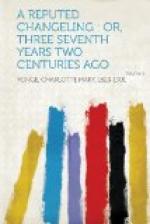That great anniversary, so delightful to him, with pony and whip prepared for him—what a day of confusion, distress, and wretchedness did it not recall to his elders? Anne could not choose but recall the time, as she sat alone in the window, looking out over the garden, the moon beginning to rise, and the sunset light still colouring the sky in the north-west, just as it had done when she returned home after the bonfire. The events of that sad morning had faded out of the foreground. The Oakshott family seemed to have resigned themselves to the mystery of Peregrine’s fate. Only his mother had declined from the time of his disappearance. When it was ascertained that his uncle had died in Russia, and that nothing had been heard of him there, it seemed to bring on a fresh stage of her illness, and she had expired at last in Martha Browning’s arms, her last words being a blessing not only to Robert, but to Peregrine, and a broken entreaty to her husband to forgive the boy, for he might have been better if they had used him well.
Martha was then found to hold out against the idea of his being dead. Little affection and scant civility as she had received from him, her dutiful heart had attached itself to her destined lord, and no doubt her imagination had been excited by his curious abilities, and her compassion by the persecution he suffered at home. At any rate, when, after a proper interval, the Major tried to transfer her to his remaining son, she held out against it for a long interval, until at last, after full three years, the desolation and disorganisation of Oakwood without a mistress, a severe illness of the Major, and the distress of his son, so worked upon her feelings that she consented to the marriage with Robert, and had ever since been the ruling spirit at Oakwood, and a very different one from what had been expected—sensible, kindly, and beneficent, and allowing the young husband more liberty and indulgence than he had ever known before.
The remembrance of Peregrine seemed to have entirely passed away, and Anne had been troubled with no more apparitions, so that though she thought over the strange scene of that terrible morning, the rapid combat, the hasty concealment, the distracted face of the unhappy youth, it was with the thought that time had been a healer, and that Charles might surely now return home. And what then?
She raised her eyes to the open window, and what did she behold in the moonlight streaming full upon the great tree rose below? It was the same face and figure that had three times startled her before, the figure dark and the face very white in the moonlight, but like nothing else, and with that odd, one-sided feather as of old. It had flitted ere she could point its place—gone in a single flash— but she was greatly startled! Had it come to protest against the scheme she had begun to indulge in on that very night of all nights, or had it merely been her imagination? For nothing was visible, though she leant from the window, no sound was to be heard, though when she tried to complete her work, her hands trembled and the paper rustled, so that Philip showed symptoms of wakening, and she had to defer her task till early morning.




